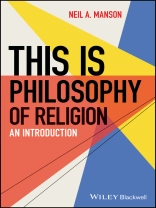A reader-friendly introduction to the essential concepts, theories, and questions in analytic philosophy of religion
Does God exist? If so, what is God’s relationship to us? Do we have free will? This is Philosophy of Religion surveys foundational topics in the philosophy of religion using a clear and accessible style. Straightforward and easy to comprehend for those with no prior philosophical background, this engaging introduction familiarizes readers with the vocabulary, methods, and major concepts in the philosophy of religion, and invites them to think through questions which arise in the intersection of philosophy, theology, and religious studies. Part of the popular This is Philosophy series, this book applies the basic investigative methods of philosophy to questions of religion, faith, and morality.
Chapters offer a framework for thinking about religion, present arguments for and against the existence of God, discuss religious diversity, consider the intellectual co-existence of faith and reason, and examine different theories about why people are religious. Examples and illustrations taken from popular culture reinforce the subject’s contemporary relevance, and are complemented by a wealth of online resources for instructors on the This is Philosophy series site that encourage further reading and strengthen student comprehension of key concepts.
A dependable introduction to the philosophy of religion, This is Philosophy of Religion is an ideal gateway to the discipline for readers who want to engage with questions about religion and contemplate the philosophical implications of religious belief.
Inhaltsverzeichnis
Acknowledgments viii
An Introduction to This is Philosophy of Religion ix
1 What is Philosophy? What is Religion? 1
1.1 What Philosophy is 1
1.2 Basic Tools of Philosophy: Logic and Analysis 2
1.3 What Religion is 12
1.4 What Philosophy of Religion is 14
Annotated Bibliography 16
2 The Concept of God 17
2.1 Logical Consistency Problems for Theism 17
2.2 Voluntarism 19
2.3 Omnipotence 24
2.4 Omniscience, Eternality, and Freedom 27
2.5 Omnibenevolence 39
2.6 Concluding Thoughts on the Concept of God 43
Annotated Bibliography 43
3 The Ontological and Cosmological Arguments for the Existence of God 45
3.1 Natural Theology 45
3.2 The Ontological Argument 46
3.3 Necessary Existence 52
3.4 The Cosmological Argument 54
3.5 Concluding Thoughts on the Ontological and Cosmological Arguments 66
Annotated Bibliography 66
4 The Design Argument for the Existence of God 68
4.1 The Basic Idea Behind the Design Argument 68
4.2 William Paley’s Analogical Version of the Design Argument 70
4.3 David Hume’s Criticisms of the Analogical Version of the Design Argument 72
4.4 The Theory of Evolution 74
4.5 Evolution and Belief in God 77
4.6 Modern Versions of the Design Argument: Preliminaries 79
4.7 The Fine-Tuning Argument 85
4.8 Miracles and the Fine-Tuning Argument 87
4.9 Criticisms of the Fine-Tuning Argument 91
4.10 Concluding Thoughts on Arguments for the Existence of God 95
Annotated Bibliography 95
5 Atheism, the Problem of Evil, and the Problem of Religious Diversity 97
5.1 Two Kinds of Atheism 97
5.2 Philosophical Underpinnings for Atheism 98
5.3 The Logical Problem of Evil 103
5.4 Responses to the Logical Problem of Evil 108
5.5 The Problem of Religious Diversity 117
5.6 Concluding Thoughts on Arguments Concerning God’s Existence 129
Annotated Bibliography 129
6 Epistemology and Religious Belief 131
6.1 Theists and Atheists in a Stalemate 131
6.2 The Classical View: Faith and Reason in Harmony 133
6.3 Pascal’s Wager: Faith in God as a Reasonable Risk 136
6.4 The Clifford-James Debate: is Believing Without Sufficient Evidence Permissible? 148
6.5 Concluding Thoughts on Faith and Reason 156
Annotated Bibliography 157
7 Naturalistic Explanations of Religion 158
7.1 What a Naturalistic Explanation is 158
7.2 Three Classic Approaches to Explaining Religion Naturalistically 161
7.3 Two Evolutionary Approaches to Explaining Religion 169
7.4 Neuroscience and Religious Experience 178
7.5 Evaluating the Naturalistic Explanations of Religion 181
Annotated Bibliography 191
Postscript: Buddhism and the Enduring Mystery of Religion 193
Glossary 200
Index 209
Über den Autor
NEIL A. MANSON is Professor of Philosophy in the Department of Philosophy and Religion at the University of Mississippi. His central research interests concern the intersection of philosophy of religion, philosophy of science, and metaphysics. He is the editor of God and Design: The Teleological Argument and Modern Science.












